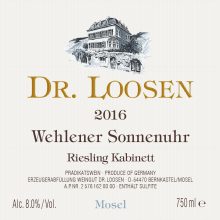
Product information
Dr Loosen Welenhur-Sonnenhur Riesling Kabinett 2016
$42
Out of stock
Size & Type
Other

$42
Out of stock
Grape Variety: 100% Riesling
Soil Type: Blue Devonian slate
Age of Vines: 60 years average; ungrafted
Viticulture: Sustainable, according to strict German environmental regulations
Average Yield: 50 hl/ha Harvest Method: Selective hand picking
Harvest Date: October 2016
Vinification: Cool fermentation in a combination of stainless steel tanks and traditional Fuder barrels; half fermented with natural yeasts, half with cultured yeasts; fermentation stopped by chilling
Bottling date: June 2017 Alcohol: 8.0%
Residual Sweetness: 42.4 grams/liter
Total Acidity: 8.4 grams/liter
Loosen has been in the same family for more than 200 years and its present guardian, Ernst Loosen, is one of the great characters of the wine world. He assumed ownership of the estate in 1988 and immediately realised that, with ungrafted vines averaging 60 years old in some of Germany’s best-rated vineyards, he had the raw materials to create stunningly intense, world-class wines. To achieve this, Erni dramatically reduced his crop size and ceased using chemical fertilisers, preferring only moderate use of organic fertilisers. And, most importantly, he turned to gentler cellar practices that allow the wine to develop to its full potential with a minimum of handling and technological meddling.
Alcohol: ~8 % Acid: ~8.5 g/L Sugar: ~40-45 g/L
Of the styles including sugar, the freshest style is Kabinett with little influence from Botrytis.
The standard line for the German’s being that where the English offer tea to guests in the afternoon the German’s offer Kabinett or Spätlese wines, more akin to a table wine. That said I devoured a Wagner-Stemple Kabinett, with pasta and cheese on a 38°C day in Melbourne, perfection!
You can see the different condition of the grapes and the detailed selection process required to produce the different styles in the film below. Starts at 2mins 30sec.
In general, you’ll find the wines from the Mosel, particularly the Wehlener Sonnenuhr vineyard, to finer, more restrained than the wines of the Rheinhessen.

The Mosel river snakes its way between dramatically steep, slatey slopes from just south of the ancient Roman city of Trier to Koblenz to the north, where it empties into the Rhine. The valley is home to many of the world’s most famous Riesling vineyards. The wines are richly fragrant, pale to golden in colour and light-bodied with lively acidity. The slaty soil lends a distinctive taste to wines which range from fine and fruity to earthy or flinty, often with a hint of spritz.
In the video below Ernie Loosen talks about the famed Wehlener Sonnenuhr vineyards. Checkout:
Where in the world does the magic happen?
Weingut Dr. Loosen, St. Johannishof, Bernkastel-Kues, Germany
You must be logged in to post a comment.